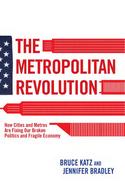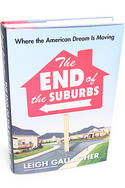Small Cities
For nearly a half century, the death of suburbs and exurbs has been prophesied by pundits, urban real-estate interests and their media allies, and they ratcheted up the volume after the housing crash of 2007. The urban periphery was destined to become “the next slums,” Christopher Leinberger wrote in The Atlantic in 2008, while a recent book by Fortune’s Leigh Gallagher, The End of Suburbs, claimed that suburbs and exurbs were on the verge of extinction as people flocked back to dense cities such as New York. read more »
Suburbia has been a favorite whipping boy of urbane intellectuals, who have foretold its decline for decades. Leigh Gallagher's "The End of the Suburbs" is the latest addition to this tired but tireless genre. The book lacks the sparkling prose and original insights one could find in the works of, say, Jane Jacobs or Lewis Mumford. Indeed, Ms. Gallagher's book is little more than a distillation of the conventional wisdom that prevails at Sunday brunch in Manhattan.
The author restages many of the old anti-suburban claims, and her introduction's section headings easily give away the gist of the argument: "Millennials hate the burbs"; "Our households are shrinking"; "We are eco-obsessed"; "The suburbs are poorly designed to begin with"; and so on. read more »
Sure, suburbs have big problems. Their designs force their inhabitants to drive in cars, instead of walking and bicycling. This diminishes face-to-face interactions, physical health, and the quality of the environment. Aesthetically, many of them, particularly those dreaded “planned communities,” are quite boring. People who live there tend not to have much contact with people who aren’t like them, so suburbs reinforce racial, religious, and class segregation. read more »
We recently explored the post-recession tsunami of online retail and discovered that e-shopping’s future is anything if not bright. According to a report by Forrester Research, by 2016, not only are 192 million U.S. consumers projected to be be clicking “checkout” (up 15% since 2012), but those 192 million will also be spending an average of 44% more. read more »
When a city bankrupts itself on the debt service of municipal bonds that were issued to keep some local pro team from bolting, residents and fans get the worst of both worlds. Losing teams and crippling interest payments are the signatures of bad deals in Cincinnati, Miami, Phoenix, and Cleveland, which collectively have taken on more than $1 billion in stadium debt to keep the Bengals, Marlins, Cardinals, and Browns in their loss columns. read more »
Planners and parents have been concerned about two widely reported, and most likely related, trends: the increasing percentage of overweight children, and the growing number of hours that kids spend looking at a screen, be it a television or a laptop. These two activities take up most of the free time kids have after school. Add on the tendency for kids to be driven or bussed to school, and the result is what has been called a “nature deficit” — a disconnect to natural surroundings. read more »
It was widely reported that the Great Recession and subsequent economic malaise changed the geography of America. Suburbs, particularly in the Sun Belt, were becoming the “new slums” as people flocked back to dense core cities. read more »
This is the introduction to "Retrofitting the Dream: Housing in the 21st Century," a new report by Joel Kotkin. To read the entire report, download the .pdf attachment below.
In recent years a powerful current of academic, business, and political opinion has suggested the demise of the classic American dream of home ownership. The basis for this conclusion rests upon a series of demographic, economic and environmental assumptions that, it is widely suggested, make the single-family house and homeownership increasingly irrelevant for most Americans. read more »
Ever since the housing bubble burst in 2007, retro-urbanists, such as Richard Florida, have taken aim at homeownership itself, and its "long-privileged place" at the center of the U.S. economy. If anything, he suggested, the government would be better off encouraging "renting, not buying." read more »
|






















